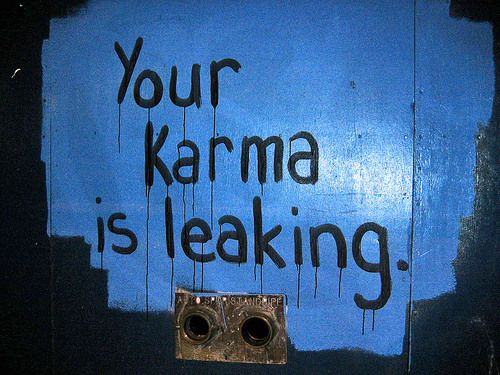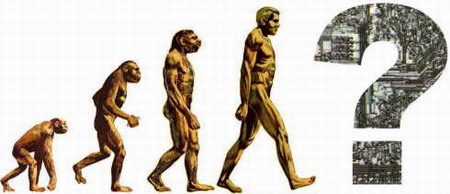What The Hell Is Karma?
I was talking to a friend the other day about karma, and I got to wondering – what the hell IS it, exactly? I mean, everyone thinks they what it is, right?
You do something bad – in this life or past – and it’ll come back & bite you on the arse.
Ok, well that’s simple.
But hang on, the wikipedia page on karma is almost 4000 words. What the hell?
Ok, so maybe there’s more to it.
The basic gist of that enormous page is that the effects of all deeds actively create your past, present & future experiences. Ie, you’re entirely responsible for your own life.
There is a subtlety though – and that is, it’s not any old deeds, but only deeds that have thought behind them. Only volitional, or consciously chosen deeds, create karma.
So, ok, if I choose to do something, that will create karma, and I’ll then have the fruits of that, good or bad, echoing through my life.
Over time – and particularly if you believe in reincarnation – that’s got to add up to one HUGE amount of karma, all banging around, recreating the same bad (or good) stuff, over and over.

(pic by consumerfriendly )
Wow. Nutty.
Now, there’s a profoundly thoughtful guy called Ram Dass, who has spent most of a lifetime thinking about this stuff (after he finished hanging out with Timothy Leary & doing a ton of acid). He’s interviewed in a thoroughly excellent documentary called Ecstatic States, and he has this to say on the subject:
Interviewer: Could you tell us exactly what karma is?
No. *laughs* That take care of that question?
You could say it’s.. uhh.. It’s a very complex concept of cause-and-effect. What it says is, if you drop a pebble into a clear pond. There’ll be all these little waves going out and out and out. And even though you could almost see them stop, with your naked eye, if you looked at it with technical equipment, you’d see that the thing keeps going and going and going.
So what it’s saying is that every action starts a sequence of events. And then who we are at any moment is determined by all the events we’ve started in the past that are reverberating into us now, over time. Over lots of time.
It’s like, you know, for example, that your childhood experiences affect your adult personality. That’s sort of an example of karma.
It’s your karma, meaning it’s the previous causal forces that are creating this particular effect. So if you look at your life, and if you have a larger sense of who you are than your physical body. I’m talking about reincarnation, or the whole idea that an individual’s soul goes through birth after birth after birth. Each birth is determined by the karmic residue of all the previous births. Then in a birth, you are living out the karma created by the previous births. Now, as you awaken more, most people are not only living out the old karma, but they keep creating new karma all the time, which keeps propelling them into the future, more and more.
To be free means to be free of this kind of karmic law that you’re just being a mechanical run-off of. So, the beginning of awakening means that you no longer create new karma, because you see how karma’s created (which is another little discussion). And then you’re just running off old karma. So a lot of the beings you see are people that have awakened sufficiently so that they don’t create any new karma, and then they’re in a body, or they continue their work, like the inertia from the past, until it runs out.
Interviewer: How do you not create new karma?
By the awareness no longer being identified with the motivation. It is the desire that creates karma. It doesn’t mean you don’t have the desires, it means your awareness is not identified with the desires. You still do what you do, but you’re not caught in being attached to the doing of it. Which is kind of sneaky, because when you’re not attached, it changes what happens.
Clear as mud? Thought so!

(pic by vidular )
What to do, what to do?
There are a couple of issues here:
1. How do we stop old karma from continuing to screw up our lives?
2. How do we, practically, stop creating new karma?
Here’s where everything gets a little speculative.
From what I’ve seen in my own life, I’m pretty sure that by healing (eg, using EFT) anything bad that happens to us (including negative thoughts, emotions, feelings), we short circuit our karmic looping of old problems. This seems a proactive way of doing what Ram Dass describes as “running off old karma”.
EFT isn’t the only way of doing this, of course. I know people that use falling still, yoga, chanting, eating raw food, meditation, and so on, to achieve the same end (or, hell, all of the above!). As Buddha says, “There are many fingers pointing at the moon, but only one moon.”
So, if this helps to speed up getting rid of old karma, how do we also stop creating new karma? (otherwise we’re going to be chasing our own tail a bit here)
“Not being identified with the desires” or “not being attached to the doing” is fair enough, but how do you actually do that, without spending 30 years sitting on a mountain top somewhere?
Well, let’s look at it a subtly different way. Anytime we react angrily, that’s got to increase our karma, right? Similarly then, if we act from any other emotions. The only exception would be coming from a place of pure peace. If we have a still mind, and an open heart, that would have to be a place from which no new karma would be generated. It meets both Ram Dass’ & wikipedia’s criteria. Action without attachment.
How to reach that place of still mind & open heart? Is it perhaps unsurprising that the healing tools listed above seem to coincidentally result in exactly these outcomes?
Does that mean these tools will take you to a place of nirvana? Reduce all your karma to zero & have you strumming a harp on a cloud? I couldn’t possibly say. It’s a complicated thing that people have been thinking & arguing about for thousands of years. All I can say is from where I stand now, these seem like good steps to be taking in more or less the right direction.
Less attachment & suffering in this life, fewer karmic echoes in the next.




